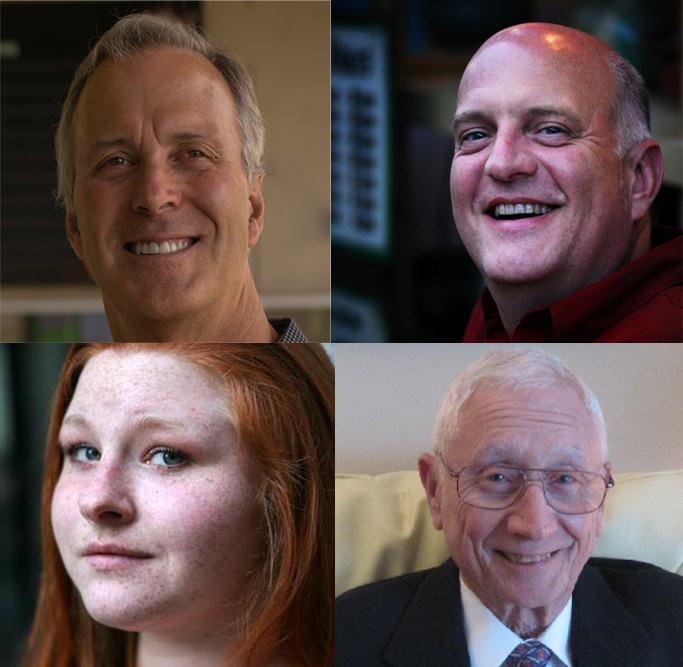Sixteen candidates have officially thrown their hats into the ring for the Asheville City Council elections this fall. Each week, Xpress will introduce, in brief, four candidates’ backgrounds and ideas for the city.
Marc Hunt
Three seats in the Asheville council are up for grabs, marking the end of Marc Hunt, Chris Pelly and Jan Davis’ four-year terms. Davis and Pelly have been on Council since 2003 and 2011, respectively, and only Vice Mayor Hunt is seeking re-election in the fall.
Elected to Council in 2011 and serving as vice mayor since 2013, Hunt’s campaign site lists his accomplishments during his last four years, which include expanding the multimodal and greenway systems, supporting affordable housing initiatives and supporting economic development partnerships.
For the future, Hunt writes, “We must … renew what is already special [in Asheville] and add quality in new ways. This is especially true in regard to infrastructure: our parks, streets and sidewalks. We must reinforce the integrity of our residential neighborhoods, … continue to attract employers and great jobs that value community and … continue to elevate our commitment to the environment and [to] sustainability.
For more on Hunt: huntforcouncil.com
LaVonda Payne
Xpress caught up with 22-year-old long-haul truck driver LaVonda Payne while she drove overnight through Ohio, making her way from Washington state to New York.
Payne sees herself as different than most candidates — for one, because she represents the youngest generation of Asheville adults, but also because she represents a demographic of citizens whose voice is not often heard.
“I’m really from this generation [of struggling locals],” Payne says. “I’ve taken the bus; I’ve been homeless. I’ve been hungry, and I had no one to help me. Sympathy and empathy only go so far in certain situations.”
She talks about people who ride the bus during multimodal initiatives, saying they “just did this as an experience.” At the end of the day, those people go home to their jobs, homes and cars. “Just because you took the bus, doesn’t mean you understand. You will never understand what it’s like. … We have all these people making decisions, but they have never had the experiences to make those decisions. They’re not even comprehending what’s wrong.”
And what is wrong?
“Asheville’s always been a tourist area,” she says, “but it’s gotten overwhelming. That’s the problem with upgrading: If your homegirl just got the new iPhone 6 and you’ve still got a flip phone, you’re going to feel the need to upgrade to feel equal. And that’s what’s happening with the city.”
Continuing her analogy, Payne explains, “Those flip phones never break, but iPhones do. Asheville was such a nice place back in the day. … Now we’re trying to compete with other cities, but we haven’t even taken care of our root-problems — our homelessness, our underprivileged kids. We’re sitting here trying to put on a front.
“I feel like people need to humble themselves and be like, ‘OK, we really do need to start taking care of our own before we start fronting for everybody else.’ … I feel like we’re losing ourselves and what we really stand for,” she continues.
Richard Liston
Richard Liston was one of the last-minute filers and is admittedly “new to the political jungle,” he says. “This is my first expedition. I tend to do well when I set my mind to something.”
Liston received his bachelor’s degree from the North Carolina School of the Arts, one master’s from Eastman School of Music and another nine years later in computer science from Wake Forest University. He received his PhD in computer science from Georgia Tech in 2004.
He’s been a musician in North Carolina and New York City, a computer scientist in Research Triangle Park, a professor at a small liberal arts college and, most recently, an educator focusing on adult education, raising funds for Sphere College Project.
Since moving to the area in 2012, Liston has “gotten to know people in Asheville from all walks of life and heard their concerns,” he said to Xpress. “I think we are not as conscious as we need to be about the direction we are taking Asheville and about how wisely we are spending our money. I’m currently studying the system of Asheville and the city budget to decide what specific changes I would recommend.
As for getting his name out there, Liston says he doesn’t “plan to spend much money on advertising. I detest seeing the signs and litter created by it all. I plan to run my campaign by building a solid social network.”
For more on Liston: avl.mx/1cr
Ken Michalove
Former Asheville Mayor and City Manager Ken Michalove announced his intentions to file just last week.
Michalove’s resume includes four years as the executive director of the Buncombe County Planning Council, eight years as the city manager, four years as mayor and eight years total on City Council.
So, after a long run, why is he back? Michalove writes that recent Council actions have spent “an inordinate amount of time and money to satisfy [their own] special interest, … adopting tax increases that were not needed.”
He says he thinks that recent budgets were “not properly reviewed and challenged, … thus taxing the citizens of Asheville unnecessarily. … The current City Council touts their support of affordable housing but raises taxes and fees unnecessarily.”
This, along with the “significant number of properties that are tax exempt,” he writes, hinders Asheville’s growth. If elected, Michalove says he’ll work to “create and preserve a tax base that can provide basic services and infrastructure.” On the most recent property tax increase, he says, “there is sufficient proof that, through proper management, that increase could have been avoided.”




Correction: Ken Michalove served as mayor for four years, not eight. He was elected to two terms, but this was when all council terms, including mayoral terms, were two years instead of four.
Thanks for the correction!
Ms Payne